Home University of Edinburgh Library Essentials
July 27, 2024
Breaking Boundaries #RDMRMA
Posted on May 4, 2016 | in Archives, Records Management, Research data management | by Stuart LewisOn the 18th April 2016 over 50 professionals from across the UK came together to discuss the intersection of three disciplines: Research Data Management, Records Management / Information Governance, and Archives. Organised by Edinburgh University Library and the Digital Curation Centre, we met in the striking historic Playfair Library, part of the University’s Old College. Delegates were encouraged to record the event using the hashtag #RDMRMA.
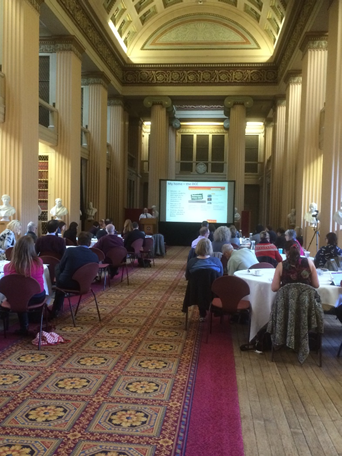
The day was kicked off by a welcome from the Library’s Head of Special Collections and the Centre for Research Collections. Following on from this, Kevin Ashley the DCC’s Director gave an overview of the issues we would likely cover along with some history of the domains working together. This was then followed by three presentations, each giving a brief overview of the specific domains:
- Records Management and Information Governance: Alan Bell (Head of Information Governance University of Dundee)
- Archives: Rachel Hosker (Archives Manager, University of Edinburgh)
- Research Data Management: Stuart Lewis (Deputy Director of Library and University Collections, The University of Edinburgh)
After a brief break, two more in-depth case studies were given:
Victoria Cranna is Archivist and Records Manager from the London School of Hygiene & Tropical Medicine. LHSTM is perhaps unique in that their institutional Research Data Management programme is run from the Library’s Archives and Records Management Team. Victoria presented a few of her frustrations about the interplay between archivists and research data professionals: frustration at the lack of communication between the two groups; archivists’ view of research data; and research data managers’ lack of connection to archivists and their skills.
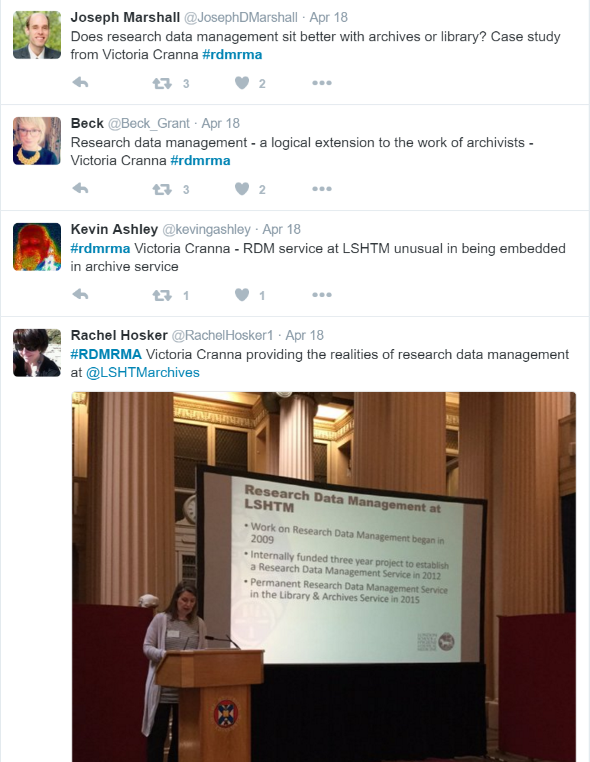
Ian Deary, Professor of Differential Psychology is Director of the Centre for Cognitive Ageing and Cognitive Epidemiology at the University of Edinburgh. Ian talked about the Lothian Birth Cohort Scottish Mental Studies from 1932 and 1947. These made use of data that was discovered from a storage cupboard in the Moray House School of Education and allowed subsequent reuse of the data over 60 years later. Ian described the sometime tortuous route that had to be followed to gain permission to use the data, how the data was coded and joined up with other data sources, and some of the outcomes that this has generated. One particular question was asked which prompted a strong response: Could you have undertaken this work if only a percentage of the data had been sampled and stored, rather than the whole dataset. The answer was a categorical “no”!
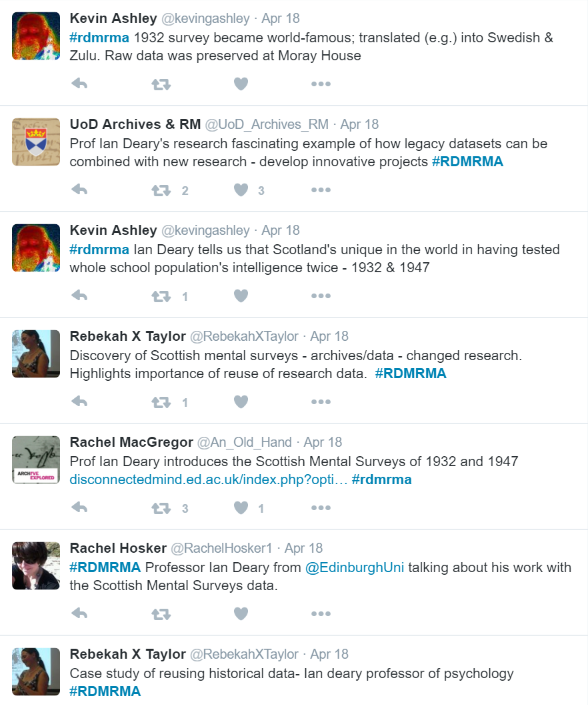
After lunch we were treated to four lightening talks that unpicked some of the issues a little further.
First up was Chris Awre, Head of Information Management at the University of Hull. Chris talked about some of the work that Hull and York universities have been undertaking with applying Archivematica and Digital Preservation approaches to research data. This ‘Filling the digital preservation gap’ is funded by Jisc as part of their Research Data Risk #DataSpring programme.
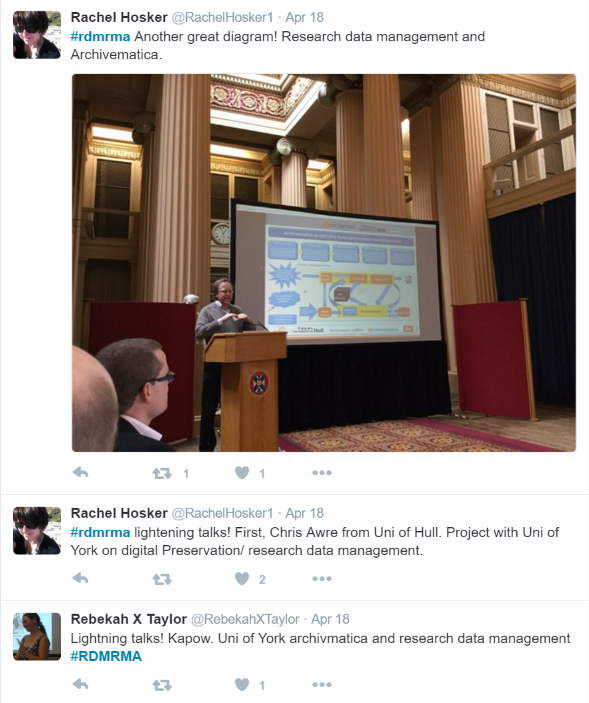
Next up Adrian Stevenson, Senior Technical Coordinator from Jisc talked about a number of issues, including linked data, discovery, and variety + quality of metadata. These partly came from Adrian’s involvement in two related discovery systems, ArchivesHub, and the UK Research Data Discovery Service. Ending his talk, Adrian asked a provoking question: are archivists scared of research data?
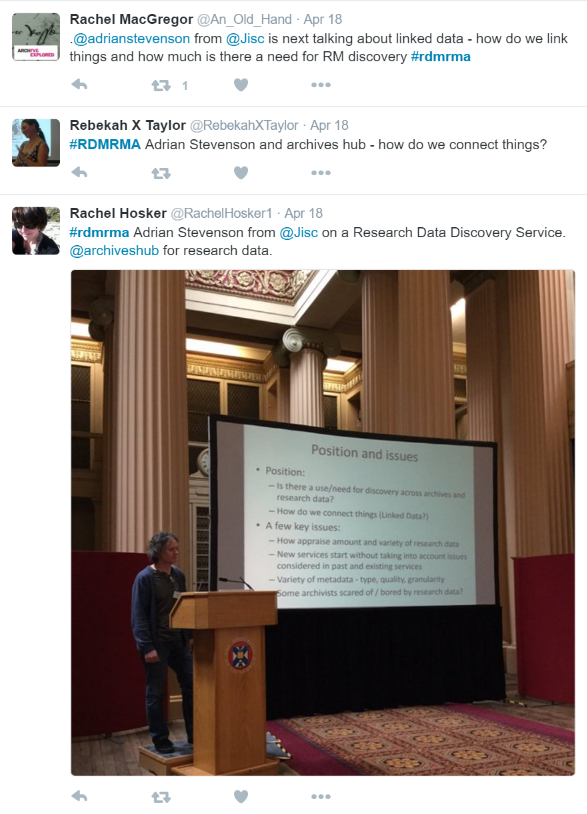
Following Adrian was Rebecca Grant, archivist at the Digital Repository of Ireland, and a PhD candidate at University College Dublin. Rebecca is one of the co-chairs of the Research Data Alliance’s Archives and Records Professionals for Research Data Interest Group, and explained about the importance of this group in advancing similar topics as the event was tackling.
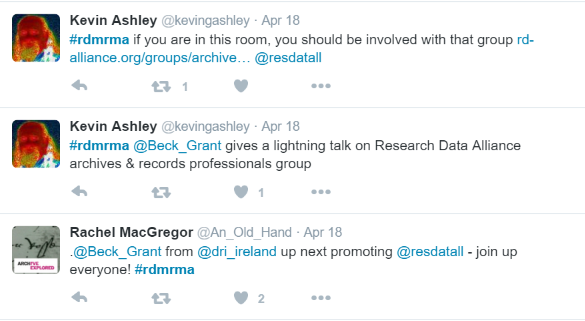
Last up was Laura Molloy, studying at the Oxford Internet Institute and Ruskin School of Art on some of the challenges relating to digital skills in the creative arts, including issues such as mapping visual art work development flow onto standard research lifecycles.

After the lightning talks, the final session was introduced by Kevin Ashley. Participants were split into eight groups, each containing a mix of the different professions. The groups were then asked to undertake two tasks:
- PESTLE analysis of issues relating to the boundaries between research data, records management, and archives (Political / Economic / Social / Technological / Legal / Environmental)
- What can be done? Top three suggestions
Each group’s top three (in some cases more!) are listed below:
Group 1:
- Communication between the professions even if the language differences are frustrating.
- Identify skills and look to transfer them between the professions.
- Think more about how to help with appraisal, which must be sustainable.
Group 2:
- Top down approach pushed from funders.
- Leadership required to push different professions and skills to work together.
- Ensure data is transferred into the custody of the institution, and make sure researchers understand that they are not the ultimate data owners.
- Need shared language (map between professions).
- All professions to be advertised as being able to assist with RDM.
Group 3:
- Communication, and perhaps improve though cross team training or mentoring across professional areas.
- Integration of systems and using standards such as ORCID is important.
- Education to train staff, making use of other skills.
Group 4:
- Physical data needs to be thought about, as most effort is currently going on digital data.
- Data format identification for RDM needs to be improved.
- Also need to think about research software and associated documentation.
- It doesn’t matter who leads on RDM in an institution, as long as the professions work together.
Group 5:
- Commonality of purpose between professions.
- Try to define a common language between professions, and to share with the research community.
- Recognise who understands which aspect of the controlling requirements.
Group 6:
- Need for knowledge sharing with legal profession (ownership, IPR, patents).
- Care studies to show consequences of good research data management.
- Danger of compliance culture due to funding requirements. Policies must be reviewed.
Group 7:
- Look for areas of commonality where we can work together, for example collection policies.
- Think about critical success factors so that we know when we are succeeding.
- Look to align systems and their approaches rather than silo systems in each profession, and include other professions such as IT.
Group 8:
- Encourage the professions to collaborate more together.
- Teach information management to improve the creation of data.
- Establish work flows for ingest, appraisal and management of research data, understanding roles and responsibilities.
Some of the talks were recorded and can be viewed online from the this blog post. Other related outputs have also been created:
- A blog post about the event by Rachel MacGregor, Digital Archivist at Lancaster University Library
- A Storify created by Rachel Hosker
- A report by Laura Hynds on the Archives & Records Association website (Section for Specialist Repositories)
Collections
 Archival Provenance Project: Emily’s finds
My name is Emily, and I’m the second of the two archive interns that...
Archival Provenance Project: Emily’s finds
My name is Emily, and I’m the second of the two archive interns that...
 Archival Provenance Project: a glimpse into the university’s history through some of its oldest manuscripts
My name is Madeleine Reynolds, a fourth year PhD candidate in History of Art....
Archival Provenance Project: a glimpse into the university’s history through some of its oldest manuscripts
My name is Madeleine Reynolds, a fourth year PhD candidate in History of Art....
Projects
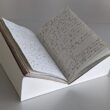 Sustainable Exhibition Making: Recyclable Book Cradles
In this post, our Technician, Robyn Rogers, discusses the recyclable book cradles she has developed...
Sustainable Exhibition Making: Recyclable Book Cradles
In this post, our Technician, Robyn Rogers, discusses the recyclable book cradles she has developed...
 Giving Decorated Paper a Home … Rehousing Books and Paper Bindings
In the first post of this two part series, our Collection Care Technician, Robyn Rogers,...
Giving Decorated Paper a Home … Rehousing Books and Paper Bindings
In the first post of this two part series, our Collection Care Technician, Robyn Rogers,...
